Puffing Billy Railway
The starting point of the railway is Belgrave station which houses the railway's operations and administration centre. The line runs through Lakeside Station where a visitor information centre provides catering and an indoor interpretive space, and terminates at Gembrook railway station.
In 2022, passengers were allowed to resume the popular practice of sitting on the window ledges of carriages with their legs dangling outside, which had become a core part of the charm of the railway.
History

The original line was opened in 1900 to serve the local farming and timber community. It ran to Gembrook from Upper Ferntree Gully station, which was the terminus of the broad gauge line from Melbourne. The section of the line from Upper Ferntree Gully to Belgrave was rebuilt to 5 ft 3 in (1,600 mm) gauge between 1958 and 1962 and is now operated by Metro Trains Melbourne suburban electric trains.
The railway had attracted a number of colloquial names locally before Puffing Billy became the dominant one. Services stopped in 1953 after a landslide blocked the line between Selby and Menzies Creek, and it was formally closed in 1954. At the end of 1954, the Victorian Railways sought to minimise their financial risks if the railway was to reopen. Harold L. Hewett, a teacher at Melbourne Grammar School, organised a rally attended by 400 people at Upper Ferntree Gully station on 4 January 1955 to try to save the railway.
Preservation
Following closure, a few farewell specials operated on the remaining usable section to Belgrave, and these proved very popular. On 1 October 1955, the Puffing Billy Preservation Society was formed to keep the railway running indefinitely. They operated trains to Belgrave until 1958 when services again ceased for conversion to a broad-gauge, electrified suburban line. The society started work on restoring the Belgrave to Lakeside section. Rover Scouts attending the 7th World Rover Moot held at Wonga Park assisted in the clearing of the line between Belgrave and Menzies Creek as part of the event's community service component. On 28 July 1962 trains resumed running between Belgrave and Menzies Creek.
Operations were extended over the remainder of the original line, opening to Emerald on 31 July 1965 and Lakeside on 18 October 1975 before reaching Gembrook, which was opened on 18 October 1998. The first trains to Gembrook carried children from the primary schools along the Belgrave–Gembrook corridor, two of which directly adjoin the railway and the remainder not more than a street away.
The railway operates daily (except for Christmas day) between Belgrave and Lakeside, with services to Gembrook on Sundays. Its infrastructure is restored and recreated to reflect the heyday of the line between 1900 and 1930, and is operated with some of the railway practices from the Victorian Railways of that era, such as using the "Staff and Ticket" safeworking system. In the 2016/17 financial year, Puffing Billy carried 487,237 passengers, up more than 60,000 from the previous financial year.
Structure


When the Puffing Billy Preservation Society was formed in 1955, the line was still under the control and ownership of the Victorian Railways (V.R.). The society arranged for the V.R. to run the train on weekends and holidays, with the Society guaranteeing the V.R. against losses from insufficient ticket sales. Society volunteers took the role of conductors, checking tickets on the train, and fund-raising. That arrangement continued until the Upper Ferntree Gully to Belgrave section of the line was closed in 1958.
When the line reopened in 1962, between Belgrave and Menzies Creek, society volunteers took a larger role, staffing stations, selling and checking tickets, doing non-safety-critical maintenance on the train, and track maintenance under the supervision of a V.R. ganger. Ticket revenue went into an account on which the V.R. drew to pay its staff involved in running the line.
The V. R. was not in the preservation or tourism business, and the arrangement was less than ideal, so the Victorian Government passed the Emerald Tourist Railway Act 1977 (No. 9020), which set up the Emerald Tourist Railway Board (ETRB) as a statutory authority to take over ownership and operation of the railway from the V. R. after 1 October 1977. The act required that the Board have between five and ten members, four of whom were to be nominated by the Puffing Billy Preservation Society. The ETRB was defined as the operator of the Railway, with the Puffing Billy Preservation Society providing the volunteer support.
All volunteers on the railway were directly engaged by the ETRB and were required to register and complete a range of induction processes. The railway still relied heavily on the volunteers, who welcome guests from all parts of the world and are highly trained to supply the safe and successful operation of the railway.
There are many roles required to operate a heritage steam railway in compliance with modern obligastions. They include signalmen, guards, firemen, engine cleaners, drivers, track patrollers, fire patrollers, safeworkers, station-masters, conductors, booking clerks, refreshment staff, gardeners, maintenance workers, researchers, and administration. Staff also operate across management, finance, human relations (HR), Occupational Health and Safety (OH&S), child safety, workshops, way and works, and operational staff who support the volunteer roles.
In 2022, the Emerald Tourist Railway Act 1977 was replaced by the Puffing Billy Railway Act 2022. That move was partly influenced by the recommendations in the 2018 report by the Victorian Ombudsman on the activities of child sex offender Robert Whitehead at the Puffing Billy Railway and other Victorian heritage railway organisations. The new act replaced the ETRB with the Puffing Billy Railway Board, the role of which was "to operate, manage and maintain the infrastructure and assets of the Puffing Billy Railway". The running of trains services remained largely in the hands of volunteers organised by the Puffing Billy Preservation Society, and they continue to be at the core of the day-to-day operation of the railway.
Operation

The main offices of the railway are at Belgrave, along with the locomotive running shed and locomotive workshops, and track maintenance operations. Other offices are located at Emerald). Trains from Belgrave generally travel to Lakeside, with some services extended to Gembrook. The railway operates every day of the year except Christmas Day.
The train has a maximum operating speed of 24 km/h (15 mph), with its average speed being 16 km/h (10 mph).
A popular feature of a ride on Puffing Billy was sitting on the ledge of the open-sided carriages. After a crash between a train and a minibus at the Menzies Creek level crossing on 5 March 2018, this practice was suspended. The suspension was permanently lifted on 4 February 2022.
There is a narrow-gauge railway museum at Menzies Creek station, which reopened in March 2022 after re-development. It is open on Friday, Saturday and Sunday.
Scandal
In 2014, Robert Whitehead, a long-serving volunteer on the railway, was convicted of multiple sexual offences against young boys. He died in prison in 2015 while serving a sentence of more than 8 years. Whitehead had been convicted and jailed in 1959 for molesting a boy scout, but he returned to his job on the railways at the request of Murray Porter, a state government minister. He joined the Puffing Billy Railway as a volunteer in 1961 and rose to become Secretary of the Puffing Billy Preservation Society. He used his position to meet and molest boys into the 1990s. In 2018, the ombudsman's report on the case found that the board of the railway had known about Whitehead's activities and had actively protected him. Significant changes have occurred at the railway since the Ombudsman Report that includes implementing the recommendations and supporting an open and transparent complaints and feedback process. In 2022, a new Victorian Parliament Act was passed that replaced the Emerald Tourist Railway Board with the Puffing Billy Railway Board. The Act modernised the governance of the railway which was noted by the Ombudsman to have failed.
Locomotives and rolling stock
Locomotives


The railway owns all the surviving Victorian Railways narrow-gauge locomotives and has restored all but one to operating condition, although not all are running at any one time. This includes 2-6-2T NA class locomotives 3A (unrestored), 6A, 7A, 8A, 12A and 14A, and G class Garratt locomotive G42.
In December 2019 NG G16 Garratt locomotive 129 imported from South Africa entered service. It had been purchased in 1996, and was rebuilt and re-gauged for the Puffing Billy. It complements the operational capabilities of G42. The NA class locomotives are limited to pulling a maximum of 12 carriages, while the Garratts can haul up to 18.
The railway has a number of smaller steam locomotives at museum at Menzies Creek, either on static display or in operating condition. These include a Peckett 0-4-0ST, 2 Decauvilles (one is a 0-4-0T, and the other a 2-4-2ST) both from the West Melbourne Gasworks, and a Climax geared locomotive from the Tyers Valley Tramway. They occasionally operate special trains and at events such as Thomas the Tank Engine days.
Puffing Billy Railway also offers driver experience days on the smaller steam engines. The Climax engine has been restored for this purpose as it has a large driving cab and is unique in Australia.
The railway operates three diesel locomotives which are used on days of total fire ban, plant or works trains, or when too few steam locomotives are available, including in emergencies. D21 is former Tasmanian Government Railways V class V12, while DH5 and DH59 are ex Queensland Railways DH class. All were regauged and rebuilt for the railway. Diesel Rail Tractor (NRT 1) is mainly used for shunting rolling stock at the carriage workshops.
VR Original
| Image | Number | Type | Builder | Serial number |
Year built | Status | Notes |
|---|---|---|---|---|---|---|---|

|
3A | NA class 2-6-2T |
Newport Workshops | 1900 | Display | The first of the VR-built NA class locomotives, built at the Victorian Railways Newport Workshops, utilising spare parts supplied with Baldwin-built 1A. Stored disassembled for future restoration. In 2015 it was placed on static display at the Menzies Creek Museum. In June 2020 it was moved to Lakeside for Display in the new Discovery Centre. | |
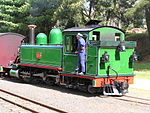
|
6A | 1901 | Operational | Has been restored as near as practicable to "as new" condition (1901–1906) of two-tone green with white lining, low-height bunker, extended side tanks, etc. It was fitted with a Lempor Exhaust System between 2002 and 2017, now taken out of traffic in March 2019 for a D exam and Overhaul and as of January 2021 is awaiting new boiler tubes prior to reassembly, but will return to service in December of 2023. | |||
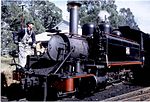
|
7A | 1905 | Has been restored as near as practicable to as new condition (1905–1910) of Canadian Pacific red & brown with white lining, low-height bunker, small head lamps, etc. | ||||

|
8A | 1908 | Has been restored as near as practicable to its 1923–1937 era of all-over black, modified front end with tapered smoke stack, large head lamps, extended bunker, etc. | ||||
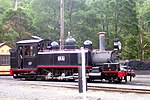
|
12A | 1912 | Has been restored as near as practicable to its 1911–1921 era of Canadian Pacific red & brown with white lining and low-height bunker, however has been given the large-style headlamps rather than the small head lamps, plus a full-width ash chute rather than the narrow ash chute. | ||||
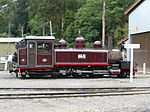
|
14A | 1914 | Has been restored as near as practicable to its later era (1938–1946) of all-over black, extended bunker, large head lamp, guard irons instead of cow-catchers, etc. It underwent conversion to oil firing during 2017 and testing in early 2018 before full return to service. | ||||
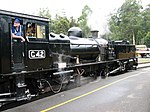
|
G 42 | G class 2-6-0+0-6-2 |
Beyer, Peacock & Company | 6268 | 1926 | The last remaining G class Garratt locomotive from the Victorian Railways. Restored to steam in 2004 as near as practicable to its 1946–1954 era of all-over black with extended cab roof, original style smoke stack, kerosene-style lamps, cow-catcher, mid-height marker lamps, etc.
G42 was withdrawn in 2021 for a major overhaul, And is currently stored in the Menzies Creek Museum on display until the time comes for it to enter the workshops at Belgrave. |
Other steam
| Image | Number | Type | Builder | Serial number |
Year built | Status | Notes |
|---|---|---|---|---|---|---|---|

|
129 | NG/G16 2-6-2+2-6-2 |
Beyer, Peacock & Company | 7430 | 1951 | Operational | South African Railways 2 ft (610 mm) gauge NG/G16 Garratt locomotive, imported to Australia in 1996. Rebuilt and re-gauged to 2 ft 6 in (762 mm) gauge as a backup for G 42. Entered service in December 2019. |
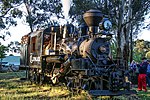
|
1694 | Climax, Two-truck |
Climax Locomotive Works | 1694 | 1928 | Operational | Climax geared steam locomotive, the last built and the only one ever built to 2 ft 6 in (762 mm) gauge. Purchased by the Forests Commission Victoria and used on the Tyers Valley Tramway to haul timber trains until 1949. After decommissioning the locomotive in the 1950s it was stored (abandoned) at the State Sawmill site at Erica until it was transferred to Puffing Billy's museum for static display in 1965. Restored to steam by the PBR in the 1980s. A major overhaul has been finished and it returned to service in September 2013. |
| 861 Decauville | 2-4-2ST | Couillet for Decauville | 1886 | Stored Operational | Previously owned by Melbourne Metropolitan Gas Company for use at the West Melbourne Gasworks. Extensively rebuilt in the 1970s as part of an attempt to restore a section of the Walhalla railway line. Privately owned and leased to the PBR. Used on Footplate Experience Trains. 861 is currently on display in Menzies Creek Museum pending a boiler inspection. | ||
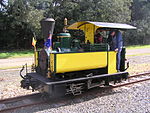
|
986 Carbon | 0-4-0T | Couillet for Decauville | 1890 | Undergoing Overhaul | Previously owned by Melbourne Metropolitan Gas Company for use at the West Melbourne Gasworks. Used at a park in Frankston in the 1970s. Privately owned and leased to the PBR. New Boiler fitted in 2013 and due to return to traffic once final works have been completed. | |

|
Peckett 1711 "Sir John Grice" | 0-4-0ST | Peckett & Sons | 1711 | 1926 | Under Overhaul | Previously owned by Melbourne Metropolitan Gas Company for use at the West Melbourne Gasworks. Often used at PBR decorated for Thomas the Tank Engine events. It has also run in an alternate guise as Peter Peckett from 1991 to 1999. |
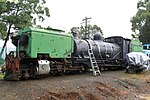
|
127 | NG G16 2-6-2+2-6-2 |
Beyer, Peacock & Company | Display | South African Railways 2 ft (610 mm) NG G16 Garratt locomotive previously used on the Banana Express, imported to Australia in 2012. Currently in storage as a source of spare parts for sister locomotive 129 and for possible future rebuild and regauging to 2 ft 6 in (762 mm) gauge as a second backup for G 42. Currently on display in the Menzies Creek Museum. | ||

|
14 Shay | Shay Two-truck |
Lima Locomotive Works | 1912 | Display | Shay geared locomotive formerly used on the Alishan Forest Railway in Taiwan, gifted by Taiwan Government in 1972. On Display in the Menzies Creek Museum. | |

|
3 Sub Nigel | 0-6-0WT | Orenstein & Koppel | 12331 | 1931 | Display | Formerly used by the Sub Nigel Gold Mining Company in South Africa. On Display in the Menzies Creek Museum. |
| 1 "Delta" | 0-6-2T | Perry Engineering | 7967.50.4 | 1950 | Display | Ex-Qunaba Mill | |

|
4 | 0-4-2ST | Hudswell Clarke | 1559 | 1925 | Display | Ex-Pleystowe Mill |

|
9 | 0-6-0 | Hudswell Clarke | 1863 | 1952 | Operational (Light steam only) | Ex-Macknade Mill |
Carriages
The mainstay of the carriage fleet are the 15 NBH open-sided carriages built specially for tourist traffic on the Gembrook line by the V.R. between 1918 and 1919, and a further 10 vehicles built to the same or similar design in the preservation era. However, there are also a number of enclosed carriages, both saloon and compartment cars. In addition, four carriages were obtained from the Mount Lyell Railway in Tasmania after its closure in 1963, and regauged and reclassified for Puffing Billy use, numbered 1 to 4 NBL. They are named Mt Lyell, Rinadeena, Teepookana, and Dubbil Barril respectively, reflecting their Tasmanian heritage. During the 1980s and 1990s they were all upgraded to first class carriages, recoded 1 to 4 NAL, and are now primarily used on the Luncheon train and Dinner trains.
Several carriages have been temporarily converted to include a guard's compartment. A number of NQR low-sided goods trucks have also been modified for passenger use, making them similar to the NBH carriages. Another three NQR trucks have been fitted with seats but no roof and are only used during the summer peak season.
| Number | Image | Year built | Builder | Status | Notes |
|---|---|---|---|---|---|
| NB | 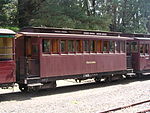
|
Operational |
Goods vehicles and brake vans
Representatives of all classes of goods vehicles and brake vans (including combined brake van and passenger carriage) used on the narrow gauge lines of the Victorian Railways are to be found on the Puffing Billy line, and are used for works trains, storage, and occasional heritage trains recreating the look of trains in the 1920s.
In popular culture
Solo One was a TV police drama series produced by Crawford Productions that screened in 1976, filmed and set in Emerald, Victoria, about a local (fictional) policeman dealing with crime in the town, however it was aimed at a younger audience than most Australian TV police dramas. It featured Puffing Billy in the opening credits scene as well as being part of most story-lines.
The ABC children's drama Come Midnight Monday was filmed in and around Belgrave, Emerald & Cockatoo and featuring Puffing Billy locomotive 12A—renamed "Wombat"—as the main character.
Filming of A Country Practice in the fictional town of Wandin Valley (the towns of Wandin, Wandin North and Wandin East are however 30 km north of Emerald) was moved to Emerald when the show moved to Network 10, and occasionally featured Puffing Billy.
The 1966 television special The Seekers at Home filmed a segment at Puffing Billy, where The Seekers sing "Morningtown Ride" to a group of children.
Filming of Round the Twist was in and around Belgrave to Lakeside.
In 1997, the soap opera Neighbours filmed scenes set on and around the train. The characters of Darren Stark and Libby Kennedy lost young Louise Carpenter and chased after the train en route to Belgrave on a motorbike to catch up with her after discovering she had boarded it.
Line guide
Puffing Billy Railway | ||||||||||||||||||||||||||||||||||||||||||||||||||||||||||||||||||||||||||||||||||||||||||||||||||||||||||||||||||||||||||||||||||||||||||||||||||||||||||||||||||||||||||||||||||||||||||||||||||||||||||||||||||||||||||||||||||||||||||||||||||||||||||||||||||||||||||||||||||||||||||||||||||||||||||||||||||||||||||||||||||||||||||||||||||||||||||||||
|---|---|---|---|---|---|---|---|---|---|---|---|---|---|---|---|---|---|---|---|---|---|---|---|---|---|---|---|---|---|---|---|---|---|---|---|---|---|---|---|---|---|---|---|---|---|---|---|---|---|---|---|---|---|---|---|---|---|---|---|---|---|---|---|---|---|---|---|---|---|---|---|---|---|---|---|---|---|---|---|---|---|---|---|---|---|---|---|---|---|---|---|---|---|---|---|---|---|---|---|---|---|---|---|---|---|---|---|---|---|---|---|---|---|---|---|---|---|---|---|---|---|---|---|---|---|---|---|---|---|---|---|---|---|---|---|---|---|---|---|---|---|---|---|---|---|---|---|---|---|---|---|---|---|---|---|---|---|---|---|---|---|---|---|---|---|---|---|---|---|---|---|---|---|---|---|---|---|---|---|---|---|---|---|---|---|---|---|---|---|---|---|---|---|---|---|---|---|---|---|---|---|---|---|---|---|---|---|---|---|---|---|---|---|---|---|---|---|---|---|---|---|---|---|---|---|---|---|---|---|---|---|---|---|---|---|---|---|---|---|---|---|---|---|---|---|---|---|---|---|---|---|---|---|---|---|---|---|---|---|---|---|---|---|---|---|---|---|---|---|---|---|---|---|---|---|---|---|---|---|---|---|---|---|---|---|---|---|---|---|---|---|---|---|---|---|---|---|---|---|---|---|---|---|---|---|---|---|---|---|---|---|---|---|---|---|---|---|---|---|---|---|---|---|---|---|---|---|---|---|---|---|---|---|---|---|---|---|---|---|---|---|---|---|---|---|---|---|---|---|---|
| ||||||||||||||||||||||||||||||||||||||||||||||||||||||||||||||||||||||||||||||||||||||||||||||||||||||||||||||||||||||||||||||||||||||||||||||||||||||||||||||||||||||||||||||||||||||||||||||||||||||||||||||||||||||||||||||||||||||||||||||||||||||||||||||||||||||||||||||||||||||||||||||||||||||||||||||||||||||||||||||||||||||||||||||||||||||||||||||
| ||||||||||||||||||||||||||||||||||||||||||||||||||||||||||||||||||||||||||||||||||||||||||||||||||||||||||||||||||||||||||||||||||||||||||||||||||||||||||||||||||||||||||||||||||||||||||||||||||||||||||||||||||||||||||||||||||||||||||||||||||||||||||||||||||||||||||||||||||||||||||||||||||||||||||||||||||||||||||||||||||||||||||||||||||||||||||||||
Regular Puffing Billy services usually only stop at stations shown in bold print at the right. Stops at other stations can be made by request. Distances are from Southern Cross station.
Bibliography
- Speed Limit 20— history of Victorian Government Narrow Gauge Lines, Edward A. Downes, ARHS(V), 1963
References
- ^ "Friends of the Trestle Bridge, Puffing Billy, Sherbrooke". Esoteric-inkworks.tripod.com. Archived from the original on 18 November 2021. Retrieved 18 November 2021.
- ^ "Lakeside Visitor Centre - Puffing Billy". puffingbilly.com.au. 5 October 2021. Archived from the original on 24 May 2022. Retrieved 5 June 2022.
- ^ "Sitting on our Carriage Sills! - Puffing Billy". puffingbilly.com.au. 29 July 2021. Archived from the original on 29 May 2022. Retrieved 5 June 2022.
- ^ A Victorian Narrow Gauge Railway The Railway Magazine issue 480 June 1937 pages 429-432
- ^ Reminiscences of the Upper Ferntree Gully–Gembrook Narrow Gauge Line Australian Railway Historical Society Bulletin April 1980 pages 69-83
- ^ Milne, A. R.; Heward, C.B. (1987). Those Boy Scouts – A Story of Scouting in Victoria. Melbourne: Victorian Scout Archives, Scouts Australia - Victorian Branch. pp. 151–152. ISBN 0949873141.
{{cite book}}: CS1 maint: ignored ISBN errors (link) - ^ Steam Preservation Down Under Railways Illustrated July 2021 page 76-80
- ^ Puffing Billy Operations Extended to Emerald Railway Transportation August 1965 page 70
- ^ Puffing Billy Preservation Society Continental Railway Journal issue 25 March 1976 page 405
- ^ Here & There Australian Railway Historical Society Bulletin issue 735 January 1999 page 32
- ^ Puffing Billy Preservation Society - Puffing Billy
- ^ Puffing Billy Services Resume on Rehabilitated Track Railway Transportation August 1962 page 9
- ^ The return of Puffing Billy Railway Gazette 17 August 1962 page 184
- ^ New authority to run Puffing Billy line, The Railway Magazine, issue 915, July 1977, page 557
- ^ Here & There, Australian Historical Railway Society Bulletin, issue 483, January 1978, page 6
- ^ "Volunteering - Puffing Billy". puffingbilly.com.au. 20 December 2017. Archived from the original on 18 May 2022. Retrieved 5 June 2022.
- ^ "Investigation into child sex offender Robert Whitehead's involvement with Puffing Billy and other railway bodies". Victorian Ombudsman. Retrieved 1 January 2025.
- ^ "Governance". Puffing Billy Railway. Retrieved 21 August 2024.
- ^ "Volunteer at Puffing Billy Railway". Puffing Billy Railway. Retrieved 21 August 2024.
- ^ Reed, Jason (2 November 2014). "Puffing Billy keeps Australian steam train history alive in the Dandenong Ranges". The Sydney Morning Herald. Retrieved 17 April 2024.
- ^ [1]
- ^ "One person injured in crash involving Puffing Billy tourist train". ABC News. 6 March 2018. Archived from the original on 18 November 2021. Retrieved 18 November 2021.
- ^ "Puffing Billy overturns ban on passengers riding with their legs out of carriages". The Age. 4 February 2022. Archived from the original on 6 February 2022. Retrieved 6 February 2022.
- ^ The Puffing Billy Railway Menzies Creek Museum reopens Railway Digest May 2020 page 55
- ^ "Puffing Billy Railway Opens Milestone Museum - Puffing Billy". puffingbilly.com.au. 21 February 2020. Archived from the original on 12 March 2020. Retrieved 29 May 2023.
- ^ Flower, Wayne (23 July 2015). "Robert Whitehead, Puffing Billy paedophile jailed for child sex attacks". Herald Sun. Archived from the original on 6 August 2020. Retrieved 18 October 2018.
- ^ Eddie, Rachel (25 June 2018). "Puffing Billy paedophile facilitated by indifference, ineptitude: Ombudsman". The New Daily.
- ^ Baker, Richard; McKenzie, Nick (28 June 2017). "Probe into claims Puffing Billy paedophile Robert Whitehead had high-level protection". The Age. Archived from the original on 18 October 2018. Retrieved 18 October 2018.
- ^ "Victorian Parliament Legislation". Victorian Parliament. Archived from the original on 3 February 2023. Retrieved 5 June 2022.
- ^ Oberg, Leon (2010). Diesel Locomotives of Australia. Terrey Hills: AH & AW Reed. p. 328. ISBN 978-0589502119.
- ^ Here & There Australian Historical Railway Society Bulletin issue 711 January 1997 page 30
- ^ Another articulated NGG16 Garratt steams Heritage Railway issue 260 25 October 2019 page 23
- ^ "Climax 1694 steams again". Puffing Billy Preservation Society. Archived from the original on 24 June 2014. Retrieved 24 June 2014.
- ^ Here & There Australian Railway Historical Society Bulletin issue 423 January 1973 page 5
- ^ "Sugar Industry Preserved Steam Locomotives". www.australiansteam.com. Retrieved 25 September 2024.
- ^ Railfan, Administration Co-operation Pays Off Railway Transportation September 1964 pages 28-31, 36
- ^ Come Midnight Monday (Drama, Family, Adventure), Australian Broadcasting Commission, 4 March 1982, archived from the original on 5 June 2022, retrieved 5 June 2022
- ^ "At Home and Down Under - The Seekers | Songs, Reviews, Credits". AllMusic. Archived from the original on 18 November 2021. Retrieved 18 November 2021.
- ^ [2]
- ^ "Lot 292: Book: Vic.: Downes, "SPEED LIMIT 20", 130pp, the". Invaluable.com. Archived from the original on 4 November 2015. Retrieved 18 November 2021.
- ^ Thompson, John E. (2002). Focus on -- Victoria's narrow gauge Whitfield Line : a pictorial tribute to the late Edward A. Downs, railway historian. Puffing Billy Preservation Society. ISBN 9780957979222.